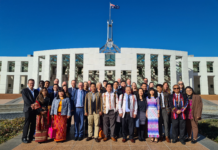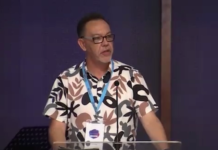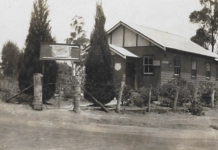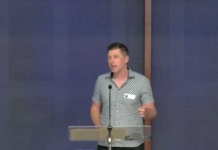
What is genuine transformation? It is the change of a person under the influence of the Holy Spirit to become more like Christ. It is a process that is continuous in the life of a Christ follower.
A key aspect of transformation is the movement away from sinful or ungodly thoughts, actions, relationships and pretty much anything that hinders your relationship with Christ. With much of the preaching today revolving around selfhelp, blessings and encouragement (which in itself is not a bad message unless it is the only message), the call to genuine repentance in the life of a disciple and the transformation it brings seems to be increasingly diluted.
As we all work out our journey with God it is vital that we wrestle with what it is to truly transform our lives under Christ, and in particular what genuine repentance looks like. In my opinion, it is the key to lasting transformation and true freedom in Christ.
Transformation comes not through appeasement rather through genuine repentance – 2 Cor 7:10-11
“Godly sorrow brings repentance that leads to salvation and leaves no regret, but worldly sorrow brings death. See what this godly sorrow has produced in you: what earnestness, what eagerness to clear yourselves, what indignation, what alarm, what longing, what concern, what readiness to see justice done. At every point you have proved yourselves to be innocent in this matter.”
Paul, in writing to the Corinthian church, challenges them with the sin they have committed. In response to the sorrow they will feel from his conviction he speaks of the difference between Godly sorrow – sadness that comes from displeasing God – compared to the worldly sorrow that is shown to appease man, or because we are sorry for our suffering as a result of sin.
True repentance, a genuine moving away from those things that displease God, is not just a prayer for forgiveness, not just a public apology, nor just accountability to minimize poor behaviour. It is a deeper, passionate reaction to an action that is as abhorrent to you as it is to God, under grace.
All people have a tendency to take the path of least resistance. I see it in my three young boys all the time. As part of what I thought was brilliant parenting I would make my boys say sorry and give each other a hug after they had done something bad to each other. This seemed to work well the first dozen times. However when I walked in to see my youngest sitting on top of his brother hitting him, saying sorry, giving a quick hug and hitting him again I realised I was not getting the result I was hoping for.
I had inadvertently taught them that as long as they appeased others, in this case me, they could do what they wanted. Only true repentance, beginning with sadness for what they had done, would bring about a change in behaviour.
True transformation requires more than appeasing others. It is about appeasing God. It is the reason why true repentance is almost impossible to ascertain. Most of us will do just about anything to show others we are sorry but it is our heart that God looks at and he is much harder to fool than people.
Are you guilty of appeasing others when you repent? Now may be the time to honestly confess to God.
Transformation comes not through excuses rather through accepting responsibility – Matt 7:12, James 4:17
My wife is blessed to be a director of a major Australian publisher with a large team working for her. A key aspect of leading this team is getting them to accept responsibility for what they do. However the most common response that her team give, when she addresses a problem, are the reasons or the extenuating circumstances that have caused the problem. When my 3 boys have a fight with each other, they will tell me all the things their brother did that caused the fight. In the same way, when we sin we tell others and ourselves all the reasons that have caused it to happen.
As a boss my wife says to her staff, as a father I say to my sons and as a teacher I say to you….”TAKE RESPONSIBILITY”!
True change will never happen unless each of us takes responsibility for what we do or do not do. We tend to allow ourselves through an inner dialogue to blame others for our actions. “I was abused”, “I was tempted”, “I am depressed”, “It is just a little sin” – all these may be true and may have contributed to your action or behaviour but it was still you that did it!
We, not just as individuals but as churches, need to actually accept that it was not our parents, not our environment, not the drugs, not the other church that did it… it was you – and you, with the help of God, are the only one who can choose NOT to do it again!
Responsibility is identifying that ultimately we have to take control of what we do and how we react. If someone hurts us, do we fight back or do we turn the other cheek? If we see injustice do we complain that nobody is doing anything or do we stand up and take action? If a childhood abuse causes weakness in our life, do we use it as an identity and an excuse, or do we seek help from a qualified professional?
We may not always be in control of what other people do but we have control over how we respond.
Who or what are you blaming for weakness in your life? It is time to take responsibility and ask yourself what you are going to do to change.
Transformation comes not through spiritualisation rather through true biblical engagement and discipleship – James 4:7-8
I heard of a pastor once who was found to be sexually harassing women in his church. Once he was caught, he began to spiritualise his actions. He claimed that God had spoken to him and that he was not guilty, he claimed that the women were possessed and that the spirit in them caused him to act inappropriately.
As followers of Christ we often fall into these traps when times of crisis come upon us. We seek to spiritualise our sin and our actions to make our sin seem more acceptable – “The devil made me do it” so to speak.
The alternative to this is our tendency to judge the spiritual health of a person by their sin. We hear of a person caught in adultery, or stealing, and we gossip about them in the name of prayer points – committing an abhorrent sin whilst condemning what we see as a worse, or less acceptable sin.
However the bible has much comfort for those who sin. A great amount of teaching in the bible is around our ability to be victorious over the work of the enemy, offering hope for those who are lost , and the ability to be transformed by the miraculous work of the Holy Spirit. The bible does not call us to excuse our sin through the word, it calls us to bask in the glorious grace given through Christ and strive for a life empowered by the Holy Spirit. Moreover it calls us to love those who have stumbled and to bring them back to faith without judgment or condemnation; looking all the time to the forgiveness and love we have received from Christ.
Never allow the richness of the bible to be watered down for a quick fix of non-scriptural comfort, or allow the enemy to have more power and authority over your humanity than you do. James 4:7-8 reminds us of this
“Submit yourselves, then, to God. Resist the devil, and he will flee from you. Come near to God and he will come near to you. Wash your hands, you sinners, and purify your hearts, you double-minded.”
Transformation comes not through works but rather through Spirit and grace-led change. Eph 2:8-10
So often we are fearful of God’s reaction to our sin or fearful of the reaction of people. We serve a gracious God who chooses to no longer remember our sin and loves us with the love of a father. Even when we know we are forgiven intellectually and have worked hard to be good and faithful followers of Christ, we struggle to accept the forgiveness, or find the freedom that we desire. To say that all we need to do is repent for transformation to begin does not seem to be the reality.
For me, transformation is encapsulated in Ephesians 2:8-10,
“For it is by grace you have been saved, through faith – and this is not from yourselves, it is the gift of God – not by works, so that no one can boast. For we are God’s handiwork, created in Christ Jesus to do good works, which God prepared in advance for us to do.”
The order of transformation in this passage takes guilt and human effort out of the equation. You are forgiven in a manner that is totally and utterly undeserved as a complete and precious gift from a gracious and loving God. It is not through our effort but by the recreation of our very being. Only after this amazing transaction takes place can our actions become inline with God’s will.
Is it time for you to accept the forgiveness that Christ is offering? If you are struggling with genuine repentance or struggling with what it is to be free in Christ please speak with your pastor or church leader.




































